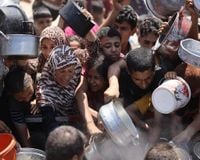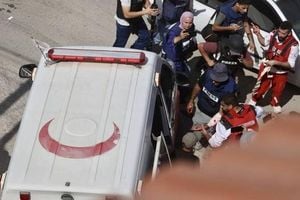It’s been nearly two years since the start of Israel’s military campaign in Gaza, and the toll on the enclave’s population continues to mount. On Friday, August 29, 2025, the Gaza health ministry reported that at least 63,025 Palestinians have been killed and 159,490 others injured in Israeli attacks since October 7, 2023. In the last 24 hours alone, at least 59 Palestinians—including 23 people seeking aid—lost their lives, according to the ministry. The suffering is compounded by a deepening humanitarian crisis, with famine and disease spreading as basic services collapse under the weight of ongoing violence and blockade.
One of the most alarming recent developments came on Thursday, August 28, when Muhammad Abu Salmiya, director of Gaza’s al-Shifa hospital, issued an urgent warning about a “new virus” sweeping through the population. “Symptoms of the virus include a high body temperature, joint pain, a runny nose, and a cough accompanied by bouts of diarrhea lasting more than a week,” Abu Salmiya explained in a statement, as reported by Maktoob Media. He added, “We do not have tests to determine the cause of the virus,” attributing its spread to “a lack of immunity resulting from malnutrition, in addition to the lack of clean water and cleaning materials, and the overcrowding of people in tents.”
The emergence of this virus is putting even greater strain on Gaza’s already overwhelmed health system, which has been battered by repeated bombardments, shortages of medical supplies, and the exodus of medical professionals. “The new virus is exacerbating the pressure on the exhausted health system,” Abu Salmiya said. The situation is so dire that, as of late August, Gaza hospitals reported five new deaths due to famine and malnutrition in just 24 hours, including two children. The total number of Palestinians who have died from famine and malnutrition now stands at 322, among them 121 children, according to the health ministry.
International organizations are sounding the alarm. The UN and multiple aid agencies have warned that famine conditions in Gaza will only worsen if Israeli restrictions on humanitarian aid and assaults on the territory continue. A joint statement from UNICEF and the World Food Programme declared, “It would have further devastating consequences for civilians where famine conditions already exist.” They cautioned that many people—especially the sick, malnourished children, older people, and those with disabilities—may be unable to evacuate as fighting intensifies.
The Integrated Food Security Phase Classification (IPC), a globally recognized body for assessing food crises, declared earlier this month that an “entirely man-made” famine is unfolding in Gaza City. The IPC warned that without an immediate ceasefire and restoration of essential services, “avoidable deaths will increase exponentially.” The report states, “The time for debate and hesitation has passed, starvation is present and is rapidly spreading.” The IPC has only declared four famines since its founding in 2004, underscoring the gravity of the current situation.
Despite the mounting humanitarian catastrophe, Israeli military operations have shown no sign of abating. On August 25, the Israel Defense Forces (IDF) declared Gaza City a “dangerous combat zone,” ending local tactical pauses that had allowed limited food deliveries. Planes and tanks have pounded parts of the city, and Israeli armored vehicles have been deployed to its outskirts. The UN estimates that around one million Palestinians could be displaced by Israel’s expanded assault on the area—many of them too frail, elderly, or ill to move safely.
Amid the chaos, individual stories of suffering and loss abound. Mohammed Abu Qamar, 42, originally from the Jabalia camp in northern Gaza, told AFP, “We don’t want to leave our home. We’re exhausted, driven north and south with no relief. Death is closing in around us. We walk on the road, not knowing if we’ll reach safety or die halfway there.”
The Israeli government, led by Prime Minister Benjamin Netanyahu, has argued that the assault is necessary to weaken Hamas and recover remaining hostages. However, many families of hostages and international observers have criticized the approach, fearing it will only endanger more civilians. On August 29, Netanyahu’s office confirmed the recovery of the body of hostage Ilan Weiss from Gaza, 692 days after he was kidnapped with his wife and daughter. Israeli President Isaac Herzog paid tribute, saying, “Ilan showed courage and noble spirit when he fought the terrorists on that dark day. In his death, he gave life.”
International responses to the crisis have been mixed and, at times, contentious. The US State Department announced on Friday that it would deny and revoke visas for members of the Palestine Liberation Organization and the Palestinian Authority ahead of the United Nations General Assembly in September. This move will likely prevent Palestinian Authority President Mahmoud Abbas from delivering his annual address in New York, further isolating Palestinian leadership on the world stage.
Meanwhile, more than 500 staff members at the UN Office of the High Commissioner for Human Rights (OHCHR) have called on the agency’s chief, Volker Türk, to publicly characterize Israel’s war on Gaza as genocide. In an internal letter, they argued that the legal threshold for genocide has been met, writing, “OHCHR has a strong legal and moral responsibility to denounce acts of genocide.” The letter continued, “Failing to denounce an unfolding genocide undermines the credibility of the UN and the human rights system itself.” Volker Türk’s office, however, has so far refrained from using the term, with a spokesperson noting that “labelling of an event as a genocide is up to a competent legal authority.”
On the diplomatic front, the UK government announced in July that it would formally recognize the state of Palestine at the UN General Assembly in September unless Israel agrees to a ceasefire and commits to a two-state solution. This move has infuriated the Israeli government, which argues it would reward terrorism and undermine efforts to combat Hamas. The UK has also sanctioned far-right Israeli ministers and broken off trade negotiations over Israel’s conduct in Gaza, but critics within Britain say the government has not done enough to pressure Netanyahu to halt the assault or address the humanitarian crisis.
Elsewhere in the region, tensions have flared. On August 28, Israeli airstrikes targeted senior Houthi figures in Sanaa, Yemen, reportedly killing Asaad al-Sharqabi, a top defense official. The Israeli military described the operation as “complex,” citing intelligence-gathering and air superiority as key factors. In Lebanon, two Lebanese soldiers were killed when an Israeli drone that had crashed in the south exploded. The Israeli military expressed “regret” over the incident and promised an investigation.
With the humanitarian situation in Gaza deteriorating rapidly, international organizations and local leaders are calling for urgent action. Cindy McCain, director of the UN World Food Programme, told the Associated Press, “It is very evident there isn’t enough food in Gaza… I personally met mothers and children who were starving in Gaza. It is real and it is happening now.”
As the world watches, the fate of Gaza’s civilians hangs in the balance, caught between military escalation, political maneuvering, and a humanitarian disaster that shows no sign of abating.




